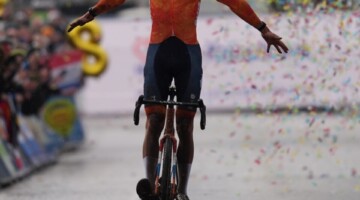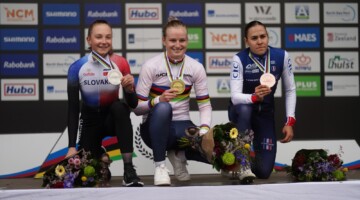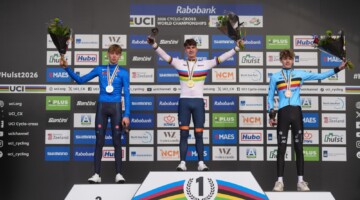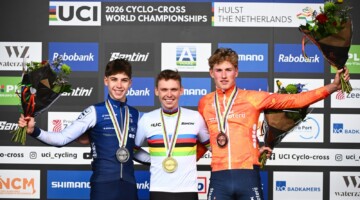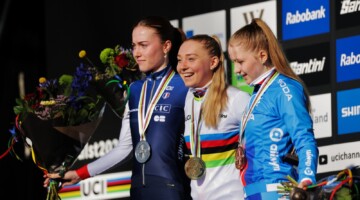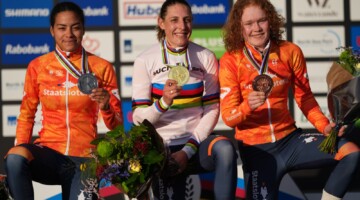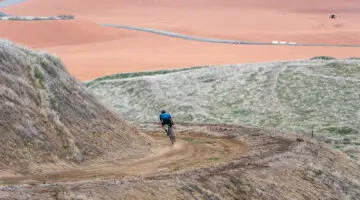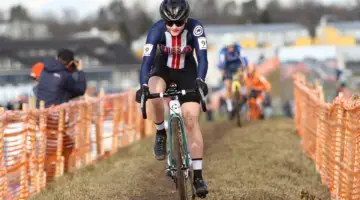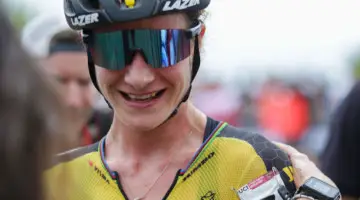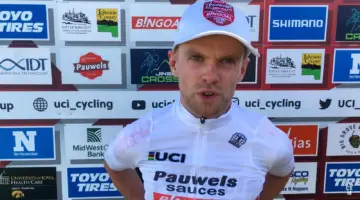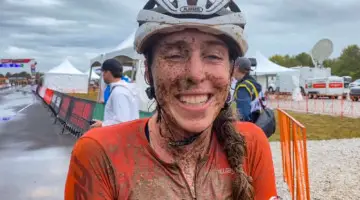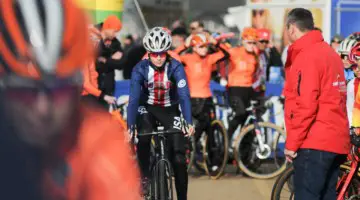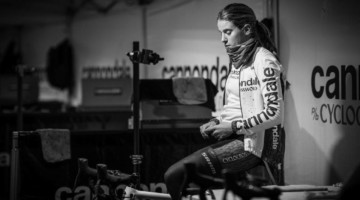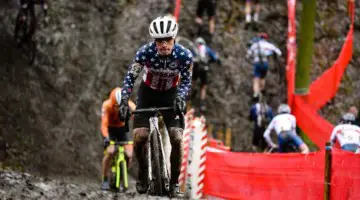Last time we saw Ryan Trebon roaming the grounds of U.S. cyclocross races, the tall Oregonian was easy to spot at the front of the races in his green Cannondale p/b Cyclocrossworld.com kit. This season, the retired rider has been more low key at UCI events, calmly watching over the races that are part of the US Cup-CX series he has helped nurture.
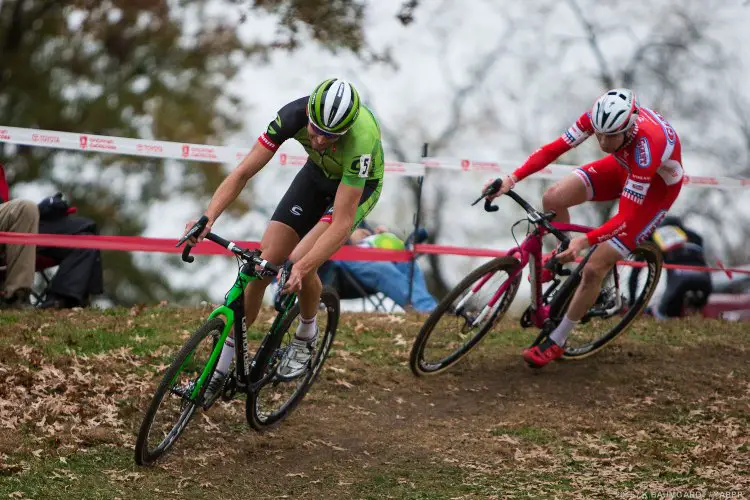
Ryan Trebon was always easy to spot when he was racing. Just look for the tall guy in a green kit at the front of the race.
Trebon partnered with Scott Tedro of Sho-Air International to help create the seven-race US Cup-CX series that culminated with last Saturday’s race at the Derby City Cup in Louisville. Trebon has done the legwork to work with promoters, generate media coverage and do everything else necessary to make the first-year series a success.
When I first ran into Trebon in Louisville, he was literally just a face in the crowd, taking in the intense racing that Stephen Hyde described as “off the chain.” I caught up with him on Sunday night after the Pan-American Championships to ask him for his thoughts on the US Cup-CX series and how the experience of directing it has been for him personally.
Interview with Ryan Trebon After the Last US Cup-CX Race of 2017
Cyclocross Magazine: Zach Schuster here with Ryan Trebon, the mastermind of the US Cup-CX series. It finished up yesterday. What are your thoughts on that last day?
Ryan Trebon: Bittersweet, you know. It was an awesome weekend of racing. The series has been really good. All seven rounds have had just fantastic racing and have been pretty well received by the riders, fans, sponsors, spectators, everyone. I kind of wish we were doing more because I like being at the events interacting with people. But we’ll just work for next year, see what we can make of it.
CXM: After it finished, did it go how you envisioned it going?
RT: Honestly, yeah. I think it went better. I was really proud and happy with how well the races went and how well the promoters did with the venues. The setup and the look and feel of things and also the reception from the riders, because ultimately we need their support to grow it. We can’t do it without them being here.
People have seemed to get behind it, and it was great. The look and feel of the events were top-notch and the racing was fantastic. The men and the women put up every weekend, both days, and raced their asses off, so my hat’s off to them. They’re what made the series good.
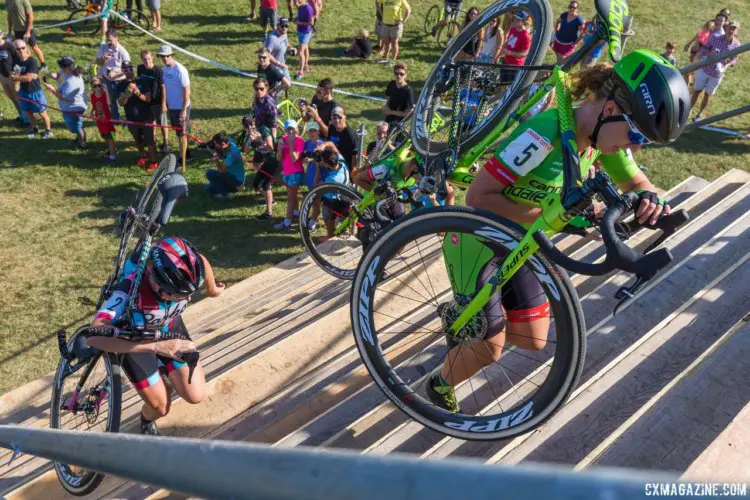
Racing throughout the series was intense and hard fought. 2017 Charm City Cross © M. Colton / Cyclocross Magazine
CXM: We were talking a second ago, you have that long-term perspective. You remember the USGP and not having it. What is it about the series that you think is really important for the sport of cyclocross?
I think our country’s too big and it’s too fractured to just have races everywhere. There are too many races, one. If there’s so much competition, and it’s easy to go here, easy to go there, then people are just going to do the path of least resistance. I think having the series brings all the riders in at once.
People have said, “That’s not a national series because there weren’t any races on the West Coast,” and my response has been, “No, it’s a national series because all the racers from around the country converge and race in one place. And we have the top racers from all over the country, at each weekend racing.” I mean, we’d obviously like it to be more spread out, but there weren’t any races in Oregon or Washington or California that fit in the calendar and offered the kind of the criteria that we were looking for.
Overall, it was good. I don’t have any complaints.
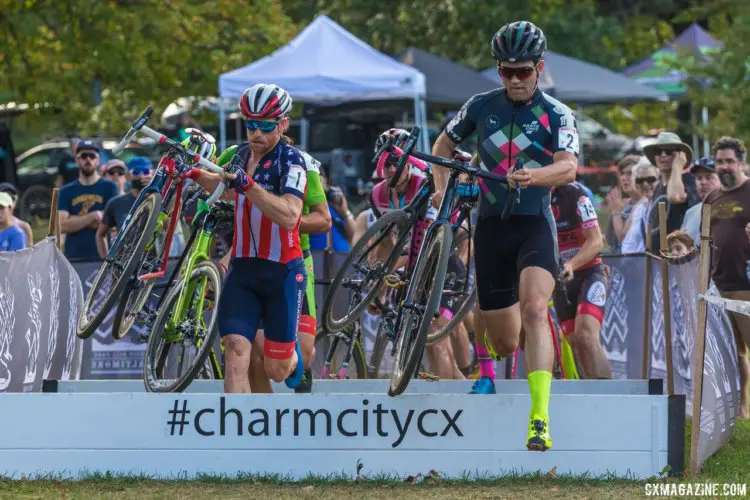
Charm City Cross was one of the four races that made up the US Cup-CX series. 2017 Charm City Cross Day 1 © M. Colton / Cyclocross Magazine
CXM: You obviously care about the sport of cyclocross and I think that always is very apparent in any interaction with you. For you personally, how has this experience been?
RT: It’s been awesome. For me, it gives me a new appreciation and respect for the amount of work people put into the events and the amount they have put into helping me have a career and a livelihood racing for 15 years. You’re a racer, a lot of your results are driven by you, but if the sponsors and promoters don’t do those things, you don’t have a place to showcase yourself.
I think a big area of success for the USGP was it grew a lot of really good interest in riders right around that 18 to 22-year old range. We have a really good group of younger riders coming up, but they need a place to go race. If they can’t be successful professionally racing cyclocross, they’re going to do something else where they can make money. Even though their passion might be in ’cross, you can’t just do it because you want to. You need to eventually make a living.
My goal would be that we start giving these Juniors somewhere to go. The guys like Spencer Petrov and Gage Hecht, they need a place to race domestically, outside of Europe, to have careers. Unless you want to go live in Europe and race all the Superprestige and the DVV races, you need a place in the U.S. to race. You can’t just think, “I’m going to go, ‘Oh, I’m going to do this C2 that weekend, this C2 the next weekend,” because, as we’ve seen the last couple of years, the schedule has shrunken a little bit because people don’t know where to spend their money, and they don’t know where to focus, and they don’t know what they’re going to get out of it.
I think you need to have a good, robust national series where sponsors can build programs and have a quantifiable thing to sell to people and showcase their athletes.
That’s the main goal. I would work with the series showcasing the riders. The riders make the races look good and they make us look good, the series looks good. The series is the riders. Because at the end of the day, I want the primary focus to be on them.
CXM: Along those lines, do you think the way that you did it, where the promoters still ran their events and you guys attached to that, do you think that that’s the way to go in the future?
RT: I think it’s really expensive the way the USGP did it, to own the events, because when you have a national series, you’re traveling all the time and bringing all the stuff around. To have more control, that would be nice, but if you work with quality promoters during events, you don’t have to worry about those things as much. I want the promoters to make money and have an opportunity to be successful as well.
We just want to bring value to their events. We don’t want to take away from them, and we want to let them just run their show. Each race has its own crew on the ground and they know what’s going on and how to do things. We just want to bring riders, media and attention to their events.
I hope that we were successful in doing that this year. Most of the races I’ve seen have been a higher attendance and turnout and more media attention as well. I don’t care about bringing any attention to myself, I want it all to go to the riders. I don’t mind doing interviews stuff and telling people about it, but this series is not about me, it’s about the riders and the women and men running the events. That’s what’s important.
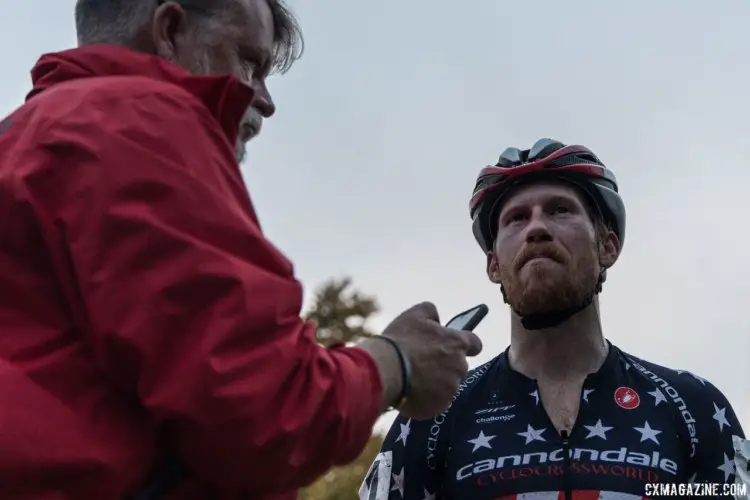
Keeping the fan and media attention focused on the riders was a big part of Trebon’s goal for the US Cup-CX series. 2017 Derby City Cup. © D. Perker / Cyclocross Magazine
CXM: One criticism we have heard is that by giving money to the winners, you’re kind of paying out to the top of the people who already have it.
RT: Here is the thing, you reward people that do well, right? I’m not going to give somebody in 20th place a check for participation. That’s not what professional sports are about. It’s the same reason why they get paid to race their bikes and you may be a privateer and have shop sponsor you. That’s what you strive to be.
We’re rewarding people for doing a really good job and consistently turning out. That’s what sponsorship is, essentially. We’re not sponsoring but rewarding people for putting on a good show. Like Stephen Hyde, Katie Compton, Kaitlin Keough, Jeremy Powers, those are what bring the fans to the races, what make the races big. All I can say is, “I’m sorry, work harder.”
Everybody starts the race with equal opportunity to be successful, and we’re rewarding the people that are the most successful. That’s life. This isn’t charity. This is a business, and everybody’s out here to make money and try and do their best. Sometimes your best isn’t good enough, and you’re not making money.
CXM: Along those lines, the payouts going deeper, it seemed like that really kind of helped. It made it more interesting for those second and third spots. Do you think that that route though is definitely gonna be a part of the future?
RT: We did the winner-take-all because we wanted the large amount to be a talking point and selling point for the series. I told people, after watching the third and fourth rounds in Baltimore at Charm City, I was like, These guys and women are really racing hard both days. They’re putting out and putting on a good show. They are earning the money. I’m not giving them money, they are earning every dollar that they got. They are racing hard. They well-deserved all the money that they received this year.
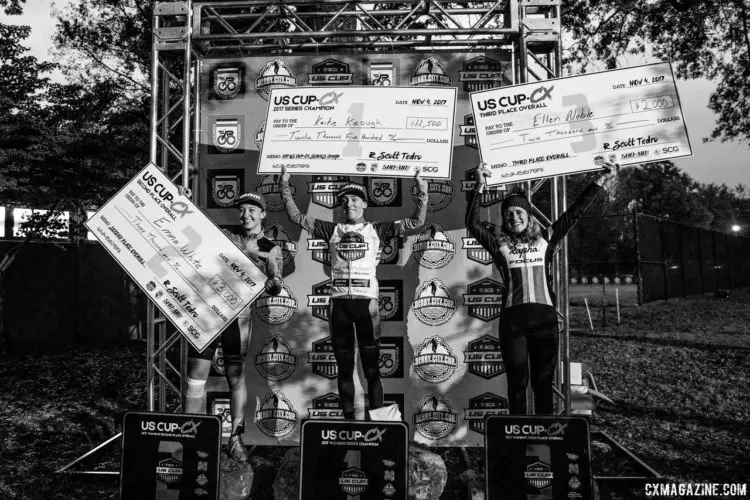
Kaitie Keough, Emma White and Ellen Noble took home checks for finishing in the top three in the US Cup-CX series. 2017 Derby City Cup. © D. Perker / Cyclocross Magazine
CXM: Well, thanks man, I appreciate your time and, I guess the sport of cyclocross appreciates everything that you did. And we’ll look forward to it next year.
RT: Thanks, I hope you guys are stoked with the coverage, and we’ll just keep trying to make it bigger and better.
CXM: They’ve been great races. I mean, being out here today, seeing the way people race, you’d have to see it to believe it. But it was pretty impressive, don’t you think?
RT: It’s awesome. I’ve only ever been in big national level races, and it’s fun to see people cheer for them. I like rooting for the riders because a lot of the people I know personally as friends. It’s fun being out there.
CXM: Cool, well thanks, Ryan. We’ll see you next year.
RT: Thanks a lot.
Stay tuned for our continuing coverage of the 2017 Pan-American Championships and Derby City Cup.

